
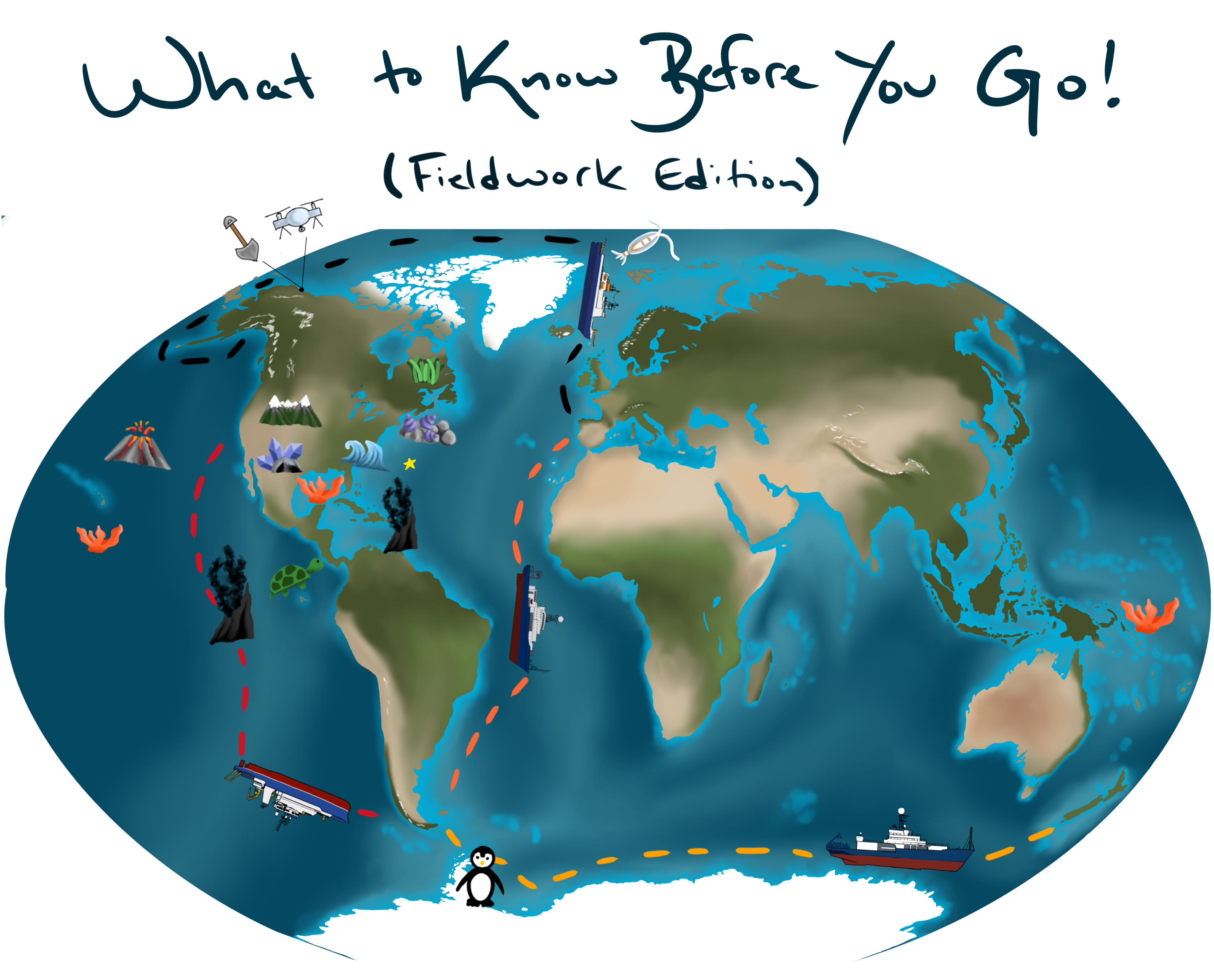
Intro
When you think of the life of an oceanographer, you might start imagining scientists in wetsuits, smiling widely as they splash around in the waves doing ‘science' (in the broadest sense), but there’s a lot more to fieldwork than that. From spending months at sea in a 300-foot research vessel to riding around on jet skis to survey the bathymetry of a surfzone - there are numerous different types of research activities that all get lumped into the term ‘fieldwork’. Broadly speaking, oceanographic fieldwork means research in the natural environment that you study (for example, someone who studies corals, might do fieldwork where they SCUBA dive at reefs).
For many of us, being in the field is a source of inspiration. We immerse ourselves in the environments we study where ideas that would never find us at our desks, are right before our eyes.
Fieldwork may also bring some less-obvious benefits. Many scientists have made their closest friends, built their strongest professional networks, and sometimes even met their partners in the field! But, let’s be honest: fieldwork is not always the dreamscape that people make it out to be. There are many barriers to fieldwork. In an attempt to illustrate the wide range of challenges and successes Joint Program students face in the field, Through the Porthole conducted a survey of our fellow students about their experiences in the field. Behind the romantic shimmer of fieldwork is the reality that being in the field can be really difficult. Not every day brings picturesque sunsets and dolphins. Although in most cases the benefit of fieldwork outweighs the exhaustion and frustration, this article dives into things to consider when going into the field, in the hope of making future field experiences as positive as possible.
This video shows JP student Ciara Dooley surveying bathymetry in the surfzone on a jetski. The jetski is custom built and equipped with GPS, an IMU, and echosounder to effectively map the seafloor at high resolution in shallow water. In the video I reach the end of my survey line near the beach and hang a u-turn to head back offshore. Video credit: Jinshi Chen
Mental Health
When working in locations where you might get to experience the auroras in Greenland fjords or watch penguins waddle by on Antarctic ice, you might not think that maintaining mental health would be a challenge. But the truth is maintaining a sense of normalcy (and being in a healthy mental state) when your working conditions are so far from normal can be difficult. A common theme among many JP students is that “it can be very isolating to be in the middle of the ocean, away from friends and family.” To compound this, the field can be a highly stressful environment. Working with constrained timelines and limited resources can create a high-pressure environment where social dynamics and mental health can become strained. As a part of our survey, we collected advice from Joint Program students on what they do to maintain their mental health in the field. A recurring piece of advice from students emphasized acceptance of mistakes: experiments fail, equipment gets lost or broken, or the weather does not cooperate. Almost every field-goer has stories of disastrous field expeditions, so try to remember that it is a normal and expected part of the work.
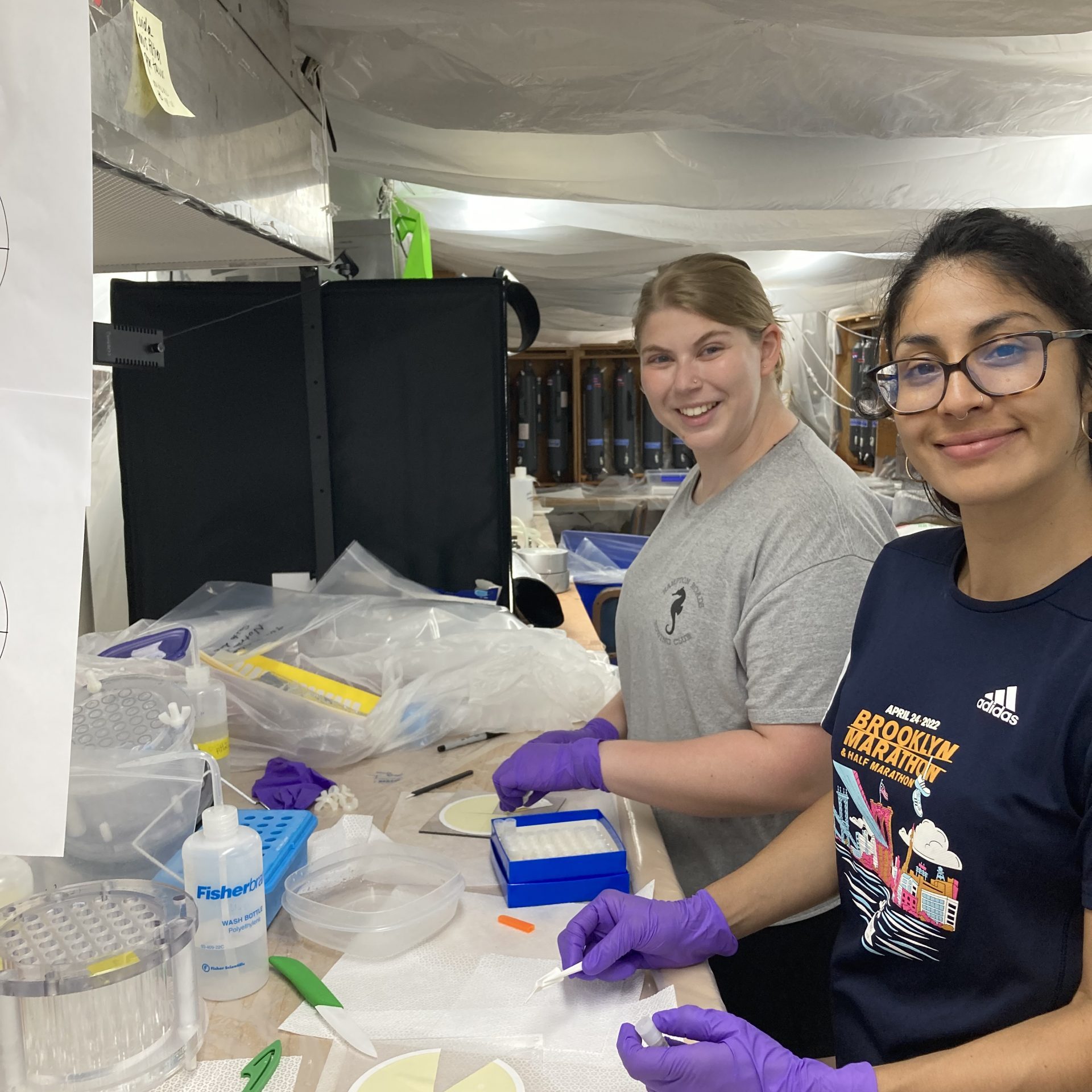
Another important factor to consider when looking after your mental health during fieldwork is the quantity and quality of sleep you’re getting. Some Joint Program students said that they often work 12-16 hour work days in the field, with one student even saying they worked 20 hour days, for multiple days in a row. Often in science there is a culture of “grin and bear it” because you need the data. This kind of culture might promote the idea that scientists need to sacrifice their health for their work, but we know that is a problematic outlook in terms of health, safety, and inclusion. Science is done best when the scientists are well-rested, and it is, of course, ideal to design your field schedule ahead of time so that it includes lots of rest. Realistically, many students do not have a lot of control over the field schedule, so this may be easier said than done. Although not always the most popular stance, it is, nonetheless, important to advocate for yourself and for your health as much as possible in these scenarios.
Other tips students gave related to maintaining mental health while in the field included…
- Not feeling guilty if they weren’t working every minute
- Don’t leave behind the things that make you happy (a book, a fun sweater if you might have a night out)
- Ask someone to write you a letter to take with you to open part way through your fieldwork if you won’t have any access to internet
Physical Needs during Field Work
Your physical needs are also important to consider during fieldwork. These can range from basic safety, like making sure there are life jackets in your size, to making sure that you have enough food to eat. Students regularly deal with physical injuries due to fieldwork, such as bruises and scrapes. But occasionally there are more serious issues. One student doing work in the Arctic fell through sea ice without anyone close enough to help them get out. Fortunately she was able to pull herself out without major injuries. Another student experienced a head injury due to a non-cleared walkway and broke their hand on a cruise. Ciara Dooley, a 5th year graduate student in Applied Ocean Physics & Engineering, noted that working in certain conditions is going to be inherently dangerous. “I fully attribute the lack of major injuries to the clear communication and safety precautions taken on our field site.”
Ciara is exactly right. Clear communication, both before you leave and during the trip, are key to ensuring that you stay safe and healthy in the field. If you are going on a ship or to a location where other colleagues have traveled, ask them about the conditions. Is the food adequate? What kinds of clothes should I bring? Don’t be afraid to ask for clarification about the situation and the expectations your PI has before going. If something feels unsafe to you, don’t be afraid to say no. In fact, this is one of the safety precautions mentioned by Ciara: “it is OK and encouraged to say no to anything that does not feel safe, even if it means losing equipment, losing data, etc.”
Finally, while you’re out in the field, make sure you pay attention to your body. One student who wished to remain anonymous told us that they “have witnessed a few close calls -- typically I think one of the bigger issues for research cruises at least is sleep deprivation and subsequent poor decision-making, and I think this is often overlooked as an issue to be addressed.” But it’s not just sleep deprivation. There tends to be an assumption in geosciences that everyone is fully-abled, when we know that isn’t the case. Don’t be afraid to advocate for your physical needs, whether by asking about the working conditions and bringing things to help you or by getting your advisor or another PI to help you figure out an accommodation. This goes for food concerns as well. If you have special dietary needs or struggle with disordered eating, make a plan for how you are going to get the calories and nutrition you need to stay strong throughout your fieldwork. The days can be long and exhausting. Making sure you have food you like and keeping your body healthy will help both physically and mentally. And, if you’re someone who menstruates, thinking ahead about your physical needs is incredibly important. This can include making sure you have enough tampons to manage your period, but could also include items you might not otherwise think of, like pregnancy tests.
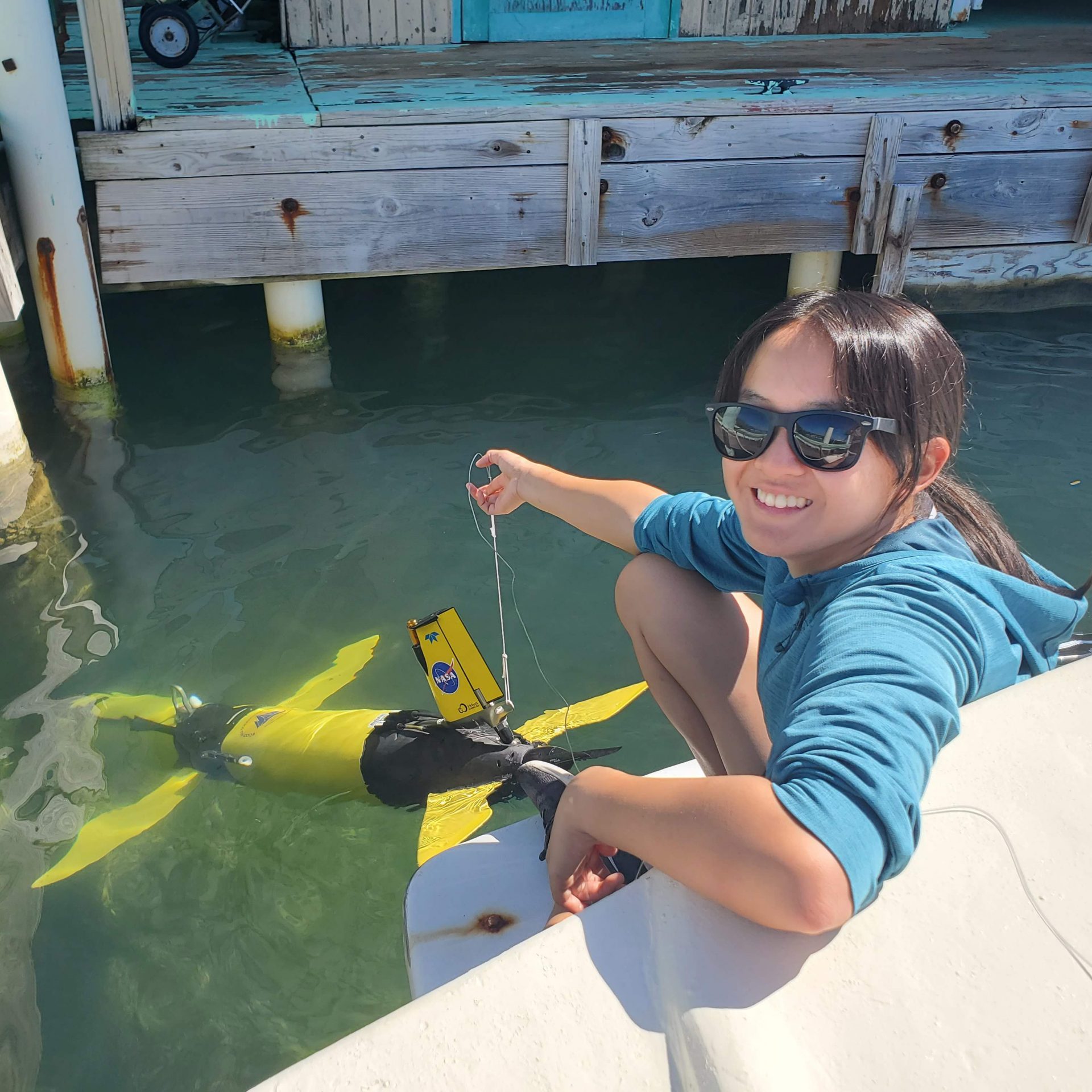
Harassment and Discrimination
One of the good things about being a graduate student in the 2020s is that there is a lot more awareness surrounding DEI issues; however, that doesn’t mean problems don’t arise. There are so many ways to feel othered while in the field, whether because of your gender, race, sexual orientation, and physical strength, just to name a few. Sometimes they manifest in humorous ways, such as second year Lilli Enders being told by a crew member after an unexpected swell that, "this is why we don't bring women to sea. I know you can control the weather with your mind because sometimes women are witches." She laughed that off: “It was the best day of my life honestly and I think about it most days.”
But there are also less benign things that can take an emotional toll on students doing fieldwork. Amy Phung, a 3rd year student in Applied Ocean Physics & Engineering, said “all my fieldwork for my research so far (i.e. excluding student trips) have been all-male, other than myself. My collaborators are fantastic folks and everybody means well, but there are times where the topic of female representation at WHOI (especially in engineering) comes up in conversation and certain comments made by my colleagues have come across as insensitive at times.” Another female student echoed these sentiments. “Being a woman in the field means you always have to speak louder (literally and metaphorically) to be recognized in the room.” said Emily Burdige, a second year in Marine Chemistry and Geochemistry.
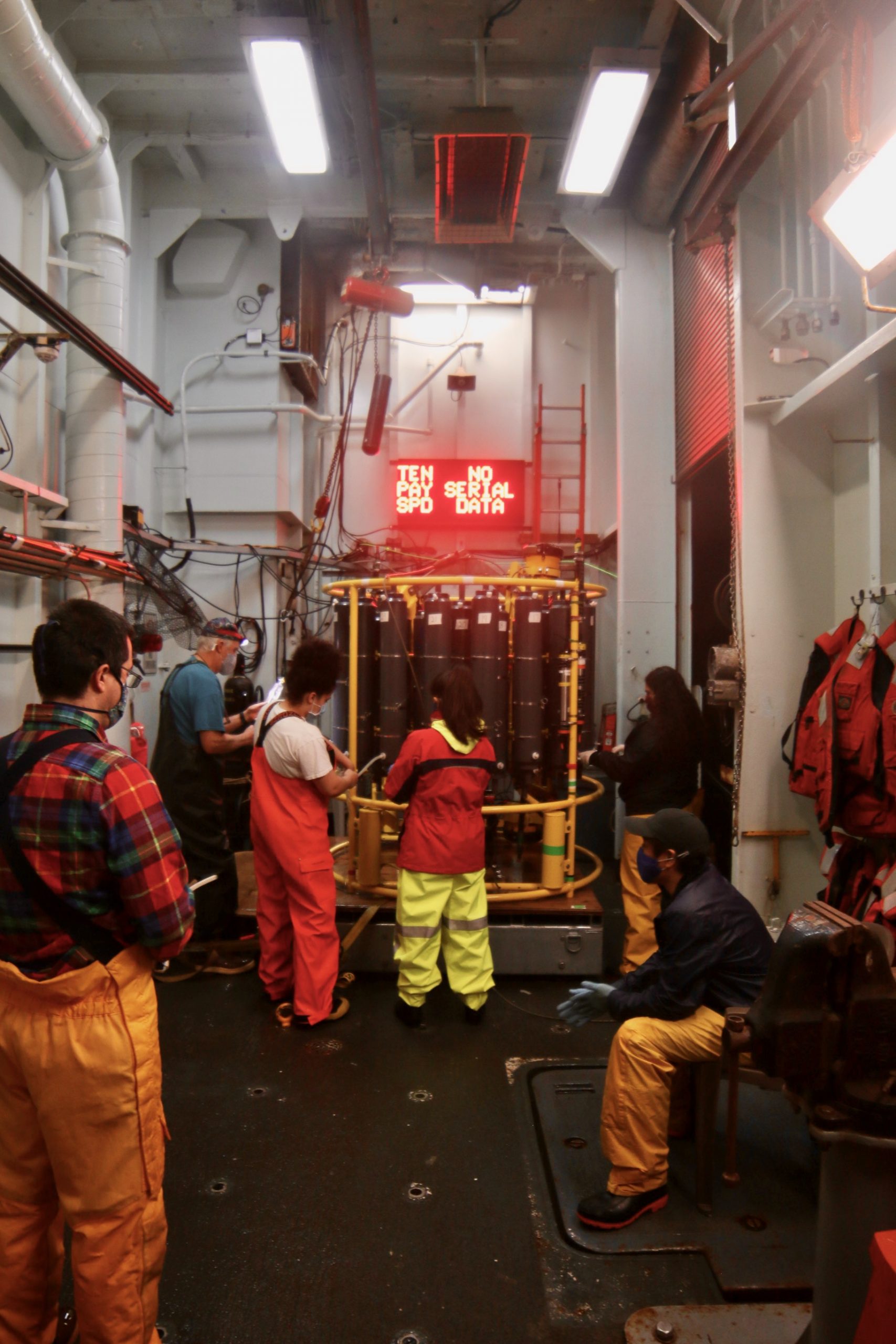
So what can be done about these issues? Well, multiple students mention that a lot of ship-based concerns are addressed through the chief scientist. “So much of it is dependent on the science party and chief scientists, who have the potential to make a research cruise either a really good or really bad experience. I've personally had one of each, and it essentially came down to a chief scientist who either promoted a positive safe environment for collaborating, or a chief scientist who actively berated others and did not set a good example of how to treat others,” said one student who wished to remain anonymous. Again, talking to other scientists and students before you go can help you decide whether these concerns will be taken seriously once on board. Ciara notes that “if people are unwilling to give a good review regarding the behavior and attitudes of those you'll be working with, it might be worth reconsidering the trip.”
All of that being said, most of the students who responded to our survey noted that they have never encountered harassment in the field. Things are definitely getting better. “I was expecting some harassment/discrimination before the trip because my advisor (a woman) had warned me about cruises. She said that things have probably gotten better, but back in her day (the 90s), it was expected [that women would be harassed on board],” said Elena Perez, a 3rd year in Physical Oceanography. She went on to say that she was pleasantly surprised to have mostly positive cruise experiences. In fact, most of the students surveyed did not report harassment or discrimination occurring during their field excursions. However, it’s good practice to familiarize yourself with the field-specific protocols for reporting harassment and discrimination.
Conclusion
Despite the challenges outlined above, 91% of the students surveyed said they want to continue doing fieldwork after they graduate. It’s an incredible and unique opportunity to participate in science in such a physical, whole-hearted way. We get to go places that only a fraction of people will ever see, which can often make up for the hardships and stress we undergo while there. Third year Amy Phung found fieldwork to be so rewarding that she mentioned, “it's really broadened my perspective on what sort of careers I might consider doing in the future. Before grad school, I'd only ever thought of applying for industry jobs, but the more I participate in field work the more I'm considering what career options will let me keep doing it.” Similarly, fifth year Lukas Taenzer spoke of the other benefits of going out on an expedition: “I like how fieldwork breaks up the monotony of purely self-driven desk work, in terms of change in place, working with others, and getting to know other people.”
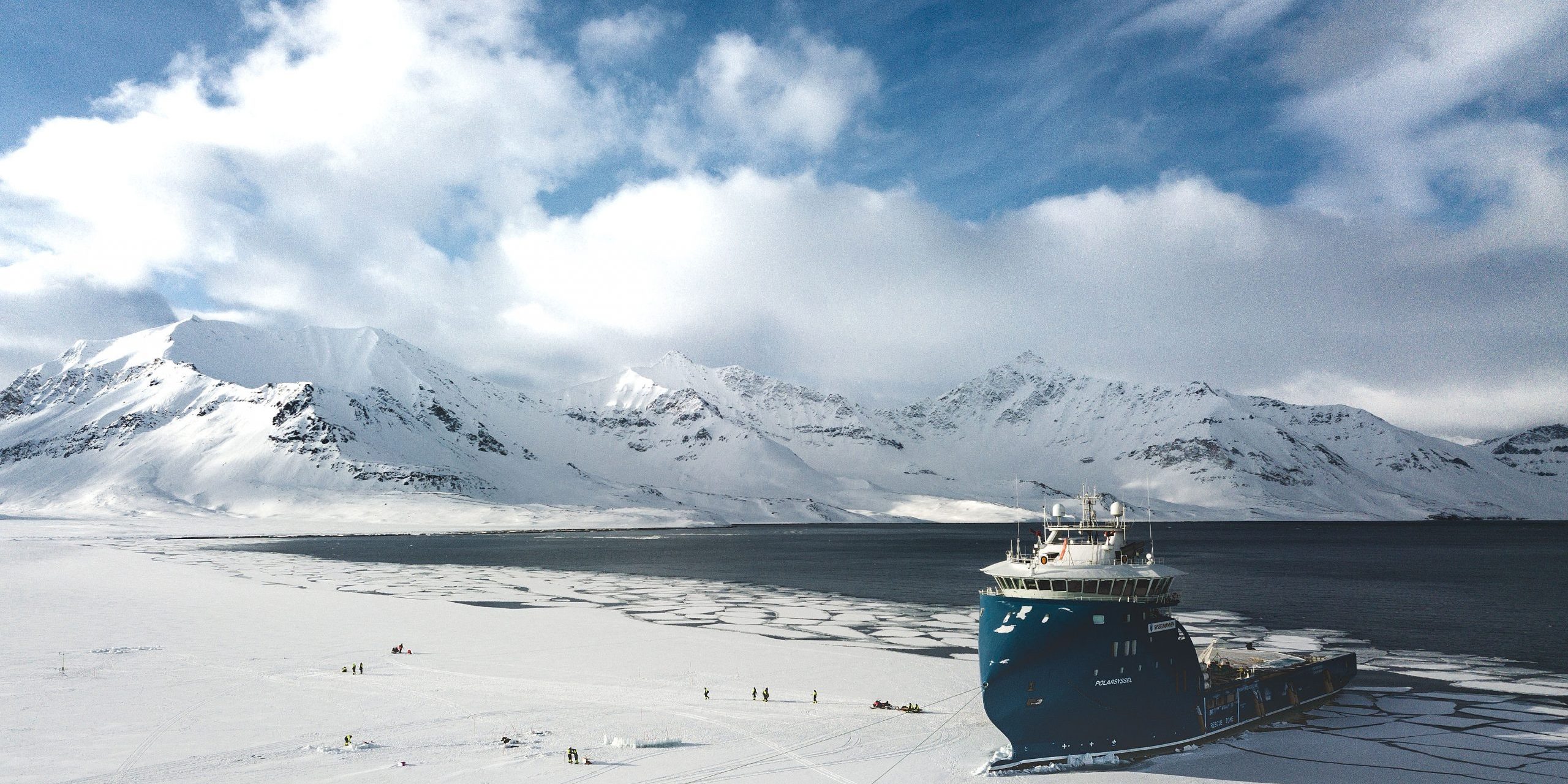
Read more of Through the Porthole Issue #11
Learn more about Through the Porthole
Learn more about the MIT-WHOI Joint Program